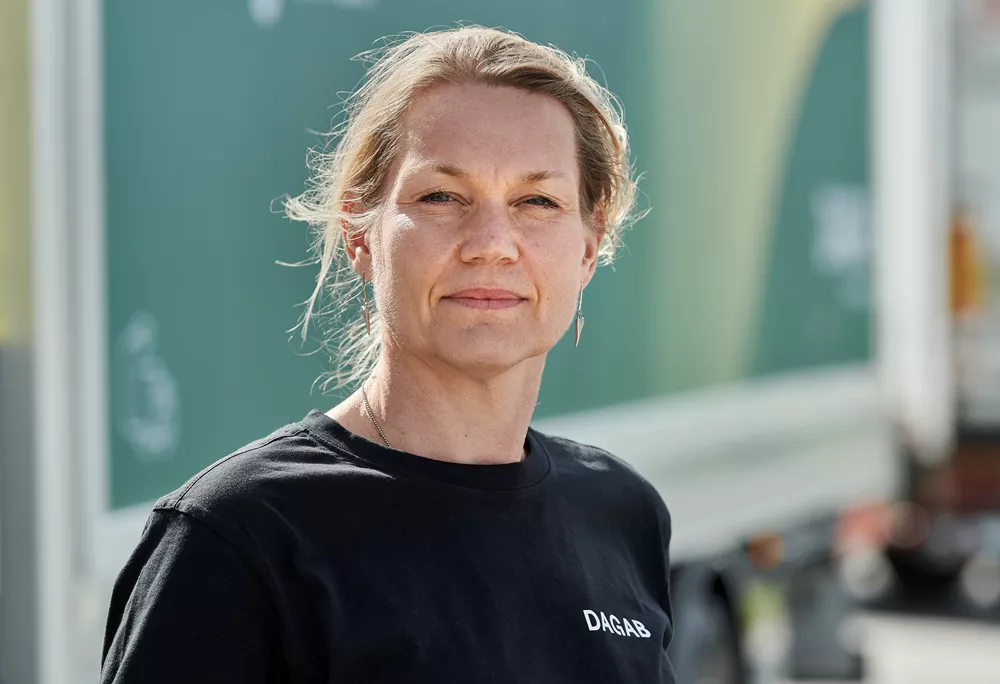In Sweden, the transport sector accounts for about one-third of domestic climate-impacting emissions. This makes the issue of transitioning to more sustainable transport extremely important – and concerning. The business I work in is, in other words, something of an emissions giant. But it also means that it is one of the keys to achieving the green transition. This is something that both challenges and motivates me in my work as the transport manager at Dagab, Axfood's purchasing and logistics company.

In Sweden, the transport sector accounts for about one-third of domestic climate-impacting emissions. This makes the issue of transitioning to more sustainable transport extremely important – and concerning. The business I work in is, in other words, something of an emissions giant. But it also means that it is one of the keys to achieving the green transition. This is something that both challenges and motivates me in my work as the transport manager at Dagab, Axfood's purchasing and logistics company.
Due to the reduction obligation being lowered at the turn of the year, climate-impacting emissions from transport will once again increase significantly. Within Axfood, we have therefore chosen to accelerate the phase-out of fossil fuels even further. Over a two-year period, both our own and hired transports between warehouses and stores will switch to running on renewable fuel or electricity. This will have a significant impact on our company's total emissions – while I hope it motivates others to follow suit.
Dagab has a large fleet of its own vehicles with approximately 200 heavy trucks for distribution between warehouses and stores and 80 light trucks for e-commerce deliveries. In addition, we are a major procurer of external transport services. We therefore have both the knowledge and the opportunity to contribute to a better environment by influencing everything from function, innovation, work environment, and sustainability issues in the industry.
In 2015, we decided to invest in different types of trucks, based on the area of use and which fuel is most suitable within the framework of each driving distance and assignment. The goal was that no vehicle type should constitute more than 50 percent of the total fleet, while all vehicles should be based on an environmentally good fuel perspective. Diversification has helped us increase our knowledge. At the same time, we have been flexible enough to take advantage of new opportunities in a market with constantly changing conditions.
Investing in and contributing to the development of electric trucks is an important part of our sustainability efforts. In 2021, we put the first fully electric heavy truck into operation, and the following year the fleet was expanded with a 64-ton electric truck, the first of its kind in Sweden. Electrification of our transports is a prerequisite for us to reduce carbon dioxide emissions. A transition must, of course, take place in all our business areas, but our transports are central to this work.
In addition to investments in electrification within heavy traffic, we are now also investing in light trucks. We have recently purchased five Iveco Daily EL light trucks with a range of around 200 kilometers. The trucks will be placed at our logistics center in Bålsta. On the e-commerce side, we would like to do even more, but the possibilities for efficient loading are limited by current driving license regulations. We are therefore advocating for experienced drivers with only a B license to be allowed to drive trucks up to 4,250 kilos (currently 3,500 kilos) when they are powered by renewable energy, electricity, or gas. Without changes to driving license regulations for environmentally classified vehicles, we need more than twice as many light trucks to transport the same volumes as we can with less environmentally friendly vehicles, as a truck battery itself weighs 750 kilos. Dagab therefore welcomes the opportunity to register for the Swedish Transport Agency's upcoming pilot project this summer, where they intend to open up for companies to participate in a test for increased load weight for vehicles powered by renewable energy.
From our experience with our heavy electric trucks, we also know that the driver's work environment improves significantly when driving electric vehicles, and that it is quiet and calm when the truck delivers goods to our end customers in residential areas, which is equally important.
I believe that what is happening now is unique. Despite many challenges, I think we will look back on this time as a turning point. It was then that it happened, the years when the playing field was redrawn, and we seriously left fossil fuels behind for major investments in renewables and electrification. Being part of that journey is both stimulating and exciting!
